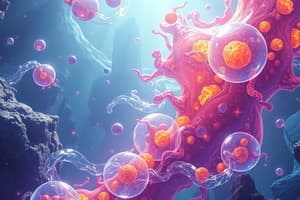Podcast
Questions and Answers
Which condition is characterized by elevation of pCO2 as a result of ventilation depression or alveolar hyperventilation?
Which condition is characterized by elevation of pCO2 as a result of ventilation depression or alveolar hyperventilation?
- Respiratory alkalosis
- Metabolic acidosis
- Respiratory acidosis (correct)
- Metabolic alkalosis
What is the common manifestation of respiratory acidosis?
What is the common manifestation of respiratory acidosis?
- Headache and restlessness
- Weakness and muscle cramps (correct)
- Fatigue and anorexia
- Nausea and vomiting
Which condition is known for causing hypocapnia?
Which condition is known for causing hypocapnia?
- Respiratory acidosis
- Metabolic alkalosis
- Respiratory alkalosis (correct)
- Metabolic acidosis
What situation can cause metabolic alkalosis?
What situation can cause metabolic alkalosis?
What is a common manifestation of metabolic alkalosis?
What is a common manifestation of metabolic alkalosis?
What is a potential risk factor for developing renal stones?
What is a potential risk factor for developing renal stones?
Which type of carcinoma arises from tubular epithelium in the renal cortex?
Which type of carcinoma arises from tubular epithelium in the renal cortex?
What is a classic clinical manifestation of renal cell carcinoma?
What is a classic clinical manifestation of renal cell carcinoma?
What is the main clinical manifestation indicating obstruction in the renal pelvis or proximal ureter?
What is the main clinical manifestation indicating obstruction in the renal pelvis or proximal ureter?
Which mechanism is responsible for adjusting the rate of reabsorption of Na and water in response to changes in GFR?
Which mechanism is responsible for adjusting the rate of reabsorption of Na and water in response to changes in GFR?
What is the primary function of a buffer in the body?
What is the primary function of a buffer in the body?
Which of the following is true about the carbonic acid-bicarbonate buffering system?
Which of the following is true about the carbonic acid-bicarbonate buffering system?
In the context of pH regulation, how does the respiratory system compensate for acidemia?
In the context of pH regulation, how does the respiratory system compensate for acidemia?
What happens if both bicarb and carbonic acid decrease in the body?
What happens if both bicarb and carbonic acid decrease in the body?
Which of the following indicates a systemic decrease in H+ concentration or an excess of base?
Which of the following indicates a systemic decrease in H+ concentration or an excess of base?
How does the renal system compensate for alkalosis?
How does the renal system compensate for alkalosis?
What does a PaCO2 level of 50mmHg indicate?
What does a PaCO2 level of 50mmHg indicate?
How does the respiratory system respond to alkalosis?
How does the respiratory system respond to alkalosis?
What is the most abundant ion in the extracellular fluid (ECF) responsible for osmotic balance of ECF?
What is the most abundant ion in the extracellular fluid (ECF) responsible for osmotic balance of ECF?
Which type of alteration involves no change in concentration but results in hypovolemia?
Which type of alteration involves no change in concentration but results in hypovolemia?
What hormone is released when there is an increase in plasma osmolality, decrease in blood pressure, and a decrease in atrial pressure?
What hormone is released when there is an increase in plasma osmolality, decrease in blood pressure, and a decrease in atrial pressure?
In hypokalemia, which hormone facilitates the movement of potassium (K+) into cells?
In hypokalemia, which hormone facilitates the movement of potassium (K+) into cells?
What causes hypertonic hyponatremia, leading to a shift of water from intracellular fluid (ICF) to extracellular fluid (ECF)?
What causes hypertonic hyponatremia, leading to a shift of water from intracellular fluid (ICF) to extracellular fluid (ECF)?
Which condition manifests as muscle weakness, hypotension, respiratory depression, and bradycardia?
Which condition manifests as muscle weakness, hypotension, respiratory depression, and bradycardia?
What is the primary role of BNP in the body?
What is the primary role of BNP in the body?
Which hormone is released in response to low serum calcium levels and increases plasma calcium via kidney reabsorption?
Which hormone is released in response to low serum calcium levels and increases plasma calcium via kidney reabsorption?
What is the primary cause of hyperphosphatemia?
What is the primary cause of hyperphosphatemia?
Which condition can result from inadequate intake or absorption, decreased parathyroid hormone, and vitamin D levels?
Which condition can result from inadequate intake or absorption, decreased parathyroid hormone, and vitamin D levels?
Which of the following is a manifestation of hyperphosphatemia?
Which of the following is a manifestation of hyperphosphatemia?
What is a common symptom of hypophosphatemia?
What is a common symptom of hypophosphatemia?
In hyperkalemia, what is a potential symptom associated with mild attacks?
In hyperkalemia, what is a potential symptom associated with mild attacks?
Which of the following is a possible symptom of hypophosphatemia?
Which of the following is a possible symptom of hypophosphatemia?
What is a common manifestation of hyperphosphatemia?
What is a common manifestation of hyperphosphatemia?
In hypophosphatemia, what is a typical symptom associated with neuromuscular irritability?
In hypophosphatemia, what is a typical symptom associated with neuromuscular irritability?
Which of the following symptoms is commonly associated with hyperkalemia?
Which of the following symptoms is commonly associated with hyperkalemia?
What is a potential manifestation of hypophosphatemia related to platelet impairment?
What is a potential manifestation of hypophosphatemia related to platelet impairment?
'Peaked T waves' are often seen in severe cases of which electrolyte imbalance?
'Peaked T waves' are often seen in severe cases of which electrolyte imbalance?
Which of the following is a classic symptom of hyperkalemia?
Which of the following is a classic symptom of hyperkalemia?
What is a potential manifestation of hypophosphatemia?
What is a potential manifestation of hypophosphatemia?
Which of the following is a common symptom of hyperphosphatemia?
Which of the following is a common symptom of hyperphosphatemia?
What is a frequent manifestation of hypophosphatemia?
What is a frequent manifestation of hypophosphatemia?
Which symptom is commonly associated with hyperphosphatemia?
Which symptom is commonly associated with hyperphosphatemia?
What is a typical sign of hypophosphatemia?
What is a typical sign of hypophosphatemia?
Which manifestation is often seen in hyperphosphatemia?
Which manifestation is often seen in hyperphosphatemia?
What is a common symptom of hypophosphatemia?
What is a common symptom of hypophosphatemia?
What is a typical sign of hyperphosphatemia?
What is a typical sign of hyperphosphatemia?
Which manifestation is frequently found in hypophosphatemia?
Which manifestation is frequently found in hypophosphatemia?
What is a potential sign of severe hyperkalemia?
What is a potential sign of severe hyperkalemia?
Which symptom is associated with extreme hypophosphatemia?
Which symptom is associated with extreme hypophosphatemia?
What is a common manifestation of severe hyperphosphatemia?
What is a common manifestation of severe hyperphosphatemia?
Which symptom may be seen in cases of profound hyperkalemia?
Which symptom may be seen in cases of profound hyperkalemia?
What is a potential neurological manifestation of severe hypophosphatemia?
What is a potential neurological manifestation of severe hypophosphatemia?
In severe hyperphosphatemia, what cardiovascular symptom might be observed?
In severe hyperphosphatemia, what cardiovascular symptom might be observed?
Which symptom can be indicative of severe hyperkalemia affecting respiratory muscles?
Which symptom can be indicative of severe hyperkalemia affecting respiratory muscles?
A patient with profound hypophosphatemia may exhibit signs of:
A patient with profound hypophosphatemia may exhibit signs of:
Flashcards are hidden until you start studying
Study Notes
Respiratory Conditions
-
Respiratory Acidosis: Characterized by elevated pCO2 due to ventilation depression or alveolar hyperventilation.
-
Common Manifestation: Symptoms often include headache, confusion, and lethargy.
-
Hypocapnia Condition: Conditions such as anxiety or hyperventilation syndrome cause hypocapnia (low pCO2 levels).
Metabolic Conditions
- Metabolic Alkalosis: Can be caused by factors like excessive vomiting or diuretic use.
- Common Manifestation: Symptoms include muscle twitching, cramps, and cardiac arrhythmias.
Renal and Carcinoma Conditions
-
Renal Stones Risk Factor: A potential risk factor includes dehydration or high dietary oxalate intake.
-
Carcinoma Type: Renal cell carcinoma arises from tubular epithelium in the renal cortex.
-
Clinical Manifestation: Symptoms may include hematuria and flank pain.
-
Obstruction Indicator: Main clinical manifestation indicating obstruction in the renal pelvis or proximal ureter is hydronephrosis.
Homeostasis Mechanisms
- Na and Water Reabsorption: Adjustments in the rate of reabsorption are mediated by kidney mechanisms in response to changes in glomerular filtration rate (GFR).
- Buffer Function: Buffers help maintain stable pH levels in the body.
Acid-Base Regulation
-
Carbonic Acid-Bicarbonate System: This system helps in regulating blood pH by balancing bicarbonate and carbonic acid levels.
-
Respiratory Compensation for Acidemia: The respiratory system compensates by increasing ventilation to blow off CO2, reducing acidity.
-
Bicarbonate and Carbonic Acid Decrease: If both decrease, it can lead to a more acidic environment (acidemia).
-
Indication of H+ Concentration: A systemic decrease in H+ concentration or an excess of base indicates alkalosis.
-
Renal Compensation for Alkalosis: The renal system adjusts bicarbonate reabsorption and hydrogen secretion.
-
PaCO2 Level: A level of 50 mmHg indicates respiratory acidosis.
-
Respiratory Response to Alkalosis: The body decreases ventilation to retain carbon dioxide.
Electrolyte Imbalances
-
ECF Ion: Sodium is the most abundant ion in extracellular fluid, crucial for osmotic balance.
-
Volume Alteration: Hypovolemic alterations involve no change in concentration while decreasing blood volume.
-
Hormonal Response: Increased plasma osmolality and low blood pressure trigger the release of antidiuretic hormone (ADH).
Potassium and Calcium Dynamics
-
Hypokalemia Hormone: Insulin helps facilitate potassium movement into cells during hypokalemia.
-
Hypertonic Hyponatremia Cause: Conditions like hyperglycemia can cause hypertonic hyponatremia by drawing water from ICF to ECF.
-
Hypokalemia Symptoms: Muscle weakness, hypotension, and respiratory depression may occur.
-
BNP Role: B-type natriuretic peptide (BNP) helps regulate blood pressure and volume.
-
Calcium Regulation: Parathyroid hormone increases plasma calcium by facilitating kidney reabsorption.
Phosphate Dynamics
-
Primary Cause of Hyperphosphatemia: Often results from renal failure or excessive phosphate intake.
-
Hyperphosphatemia Manifestations: Can include itchy skin, muscle cramps, and joint pain.
-
Hypophosphatemia Causes: Inadequate intake, malabsorption, decreased hormone levels can cause symptoms.
-
Hypophosphatemia Symptoms: Weakness, bone pain, and impaired platelet function are common symptoms.
Associated Symptoms of Electrolyte Shifts
-
Hyperkalemia Symptoms: Peaked T waves on ECG and muscle cramps or weakness are potential symptoms.
-
Severe Hyperkalemia: Can lead to respiratory muscle paralysis and arrhythmias.
-
Neurological Manifestations of Hypophosphatemia: Severe cases may lead to confusion or seizures.
-
Cardiovascular Symptoms in Severe Hyperphosphatemia: May cause hypotension or arrhythmias.
General Summary
- Severe Electrolyte Imbalances: Symptoms from hyperphosphatemia, hyperkalemia, and hypophosphatemia can overlap, necessitating careful monitoring and management.
Studying That Suits You
Use AI to generate personalized quizzes and flashcards to suit your learning preferences.





